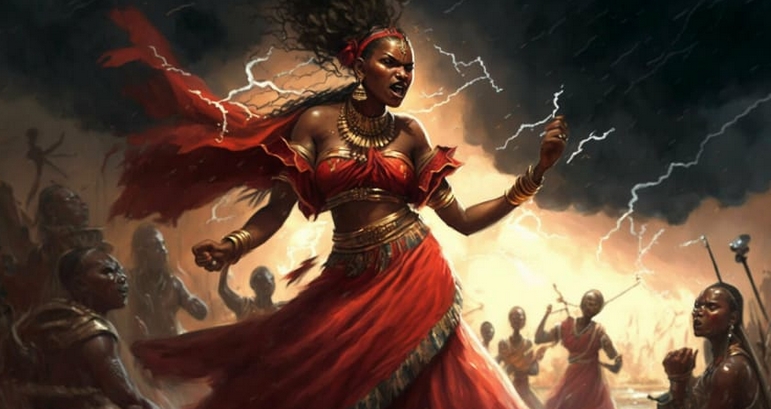
support@yorubalibrary.com
+2348073529208, 07038599574

Oya, also known as Ọya in Yoruba, is a powerful and revered deity in Yoruba mythology. She is the Orisha of winds, storms, and transformation. Her influence is felt in the swirling gusts of the wind and the raging tempests. As a symbol of change, Oya represents the inevitable cycles of life and death, making her a central figure in Yoruba spiritual practices.
Origins and Mythology
Oya is one of the wives of Shango, the Orisha of thunder and lightning. Her origins are deeply rooted in Yoruba cosmology, where she is believed to have been born from the storms themselves. Oya's mythological tales often highlight her strength, courage, and transformative powers. She is seen as a warrior goddess who fiercely protects her followers and guides them through periods of change.
Attributes and Symbols
Oya is often depicted carrying a sword or machete, symbolizing her warrior spirit. She is also associated with the buffalo, which signifies strength and resilience. Her colors are typically maroon and purple, and she is linked to the number nine, representing her nine children. Tornadoes, hurricanes, and other fierce weather phenomena are considered manifestations of her presence.
Worship and Rituals
Devotees of Oya engage in various rituals to honor and seek her blessings. These rituals often involve offerings of food, dance, and music, especially during storms. Drumming and chanting are central to these ceremonies, invoking Oya's power and protection. Temples and shrines dedicated to Oya can be found throughout Yoruba communities, where her followers gather to celebrate and venerate her.
Oya's Role in Yoruba Culture
In Yoruba culture, Oya's influence extends beyond the spiritual realm. She embodies the concept of transformation and change, encouraging individuals to embrace new beginnings and let go of the past. Her teachings emphasize resilience, adaptability, and the importance of facing challenges head-on. Oya's presence is a reminder of the cyclical nature of life and the strength found in embracing change.
Modern Influence
Today, Oya's legacy continues to inspire and guide people within and outside the Yoruba community. Her story has transcended traditional boundaries, influencing literature, art, and popular culture. Oya remains a symbol of empowerment, reminding us of the strength found in embracing our inner storms and navigating life's changes with courage and grace.
Conclusion
Oya, the Goddess of Winds and Storms, holds a revered place in Yoruba mythology and culture. Her transformative power and warrior spirit continue to inspire and guide her followers. Through her teachings, Oya encourages us to embrace change, face challenges, and find strength in the storms of life.

Learn about the Yoruba concept of Ìwà Pẹ̀lẹ́ (good…

Learn special praises for Divine Being and Creator…